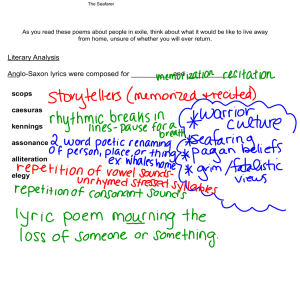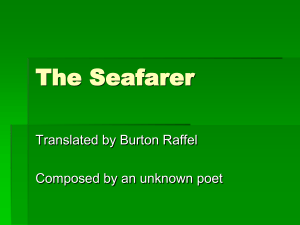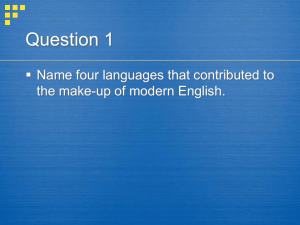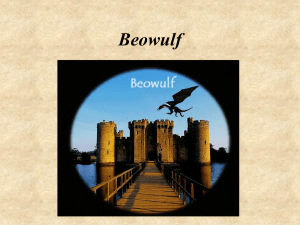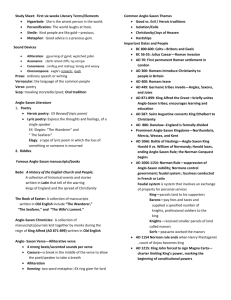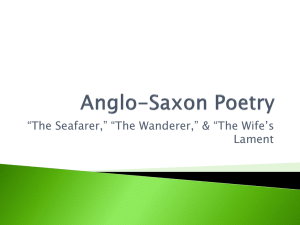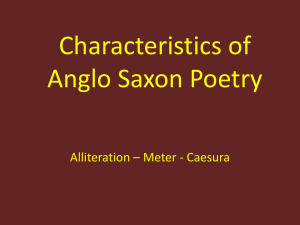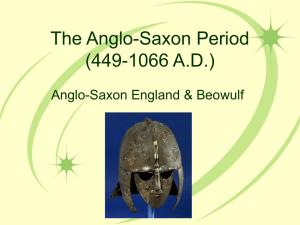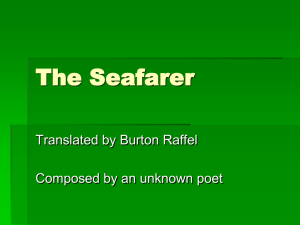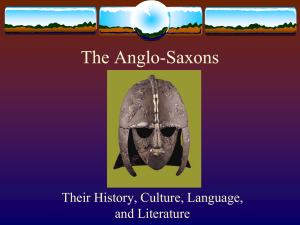File
advertisement
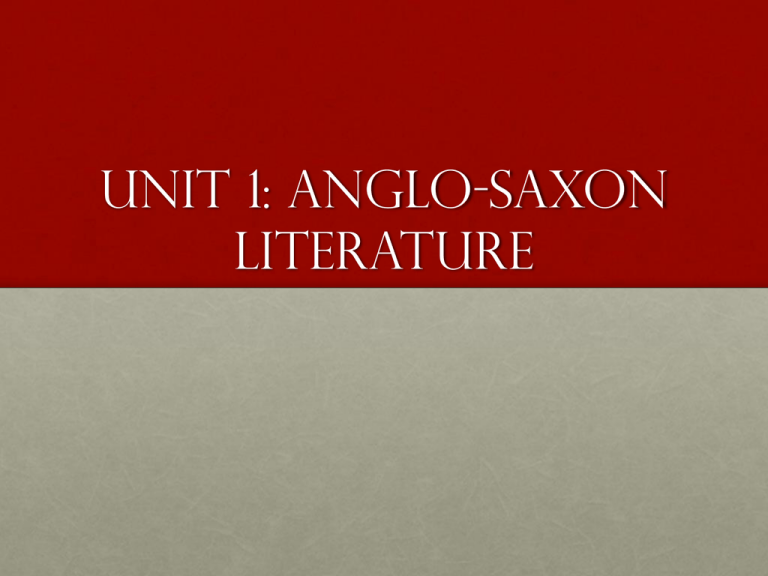
Unit 1: Anglo-Saxon Literature Learning Goals • Students will be able to apply their understanding of ancient concepts like exile, affliction, epic, and purge to modern times • Students will be able to shift their perspectives and empathize with those who are misunderstood Key terms for unit • Exile: • Epic • Affliction • Purge • Extended Quiz will be at end of unit before exam Readings • The Seafarer • The Wanderer • Excerpts from Beowulf Anglo-Saxon Pre-read • Where did this ancient people group come from? Ancient Europe Anglo-Saxon background • Between 800-600 BC two groups of Celts (pronounced with hard C) from southern Europe invaded the British Isles • Brythons (Britons) settled on the largest island, Britain • Gaels settled on the second largest island, Ireland • Celts were farmers and hunters • organized by clans (like Braveheart) Romans • Next conquerors of Britain were the Romans • More sophisticated; developed things like roads and money • 55 BC Julius Caesar invaded, true conquest 100 years later • Disciplined Roman legions spread out over the island, making camps that turned into towns • Roman rule lasted 300 years • When Northern European tribes invaded Italy, only then did Roman occupation leave to protect Rome • Last legions left in 407 AD Roman Empire BC versus AD • What does BC stand for? • Before Christ • What does AD stand for? • Anno Domini (Latin for “in the year of our Lord”) • Secular • BCE – Before Common Era • CE – Common Era 449 AD • By the time the Romans left, new invaders started arriving • Anglo-Saxons from what is now Germany • Germanic Tribes like Germania from Gladiator • Some were deep sea fisherman, others farmers • Gradually they took over England Invasion of British Isles th 4 Century influence • Around 400 AD the Romans had accepted Christianity and introduced it to Britain • Because of the vast Roman Empire, Christianity spread throughout Europe • How would this have affected every day life in Europe? Danish invasion • 9th century Norway and Denmark took to the seas when their populations boomed – Vikings • Ruthless invaders • By the middle of the 9th century, most of England had fallen to the Vikings • King Alfred “the Great” resisted the Danes • 866 AD formal truce divided England • East and North: Saxons acknowledged Danish rule • South: Danes acknowledged Saxon Rule • King Alfred encouraged learning and education • However, we are focusing on the 5th century Anglo-Saxon Literature • Started with spoken verse and incantations (old slogans, spells, charms), not books • What other cultures started with oral traditions before books? • Recited poems often at ceremonies or military victory celebrations Two types of poetry • Heroic Poetry – recounting the achievement of warriors • Beowulf: long heroic poem that tells the story of a great pagan warrior renowned for his courage, strength and dignity; Beowulf is an epic • First such work composed in English so considered national epic poem of England • What language were they writing in before? • Elegiac Poetry – lamenting the death of loved ones and the loss of the past Latin to English • Before Alfred the Great all important documents were written in Latin • Monks wrote everything in Latin; English, used by commoners, was considered vulgar • Anglo-Saxon Chronicles were started • Historical journals written and compiled in monasteries in Old English Old English • Started with low Germanic tongue brought by the Angles, Saxons, and Jutes; turned into Anglo-Saxon or Old English • Few words to recognize: bedd, candel, faederm, healp, mann, moder, waeter • Listen to Old English • Readings from Beowulf • And FYI: Shakespeare is NOT Old English!!! His writings are actually modern English Exile • Banned from one’s country; or forced from one’s home • “Home” to Anglo-Saxons was different than how we think of home • To them, “home” was wherever their king or lord was • Rather than being patriotic to a country, they were loyal to a king • He provided everything for them: food, necessities, protection from invaders • If you were forced to leave home, what are some of the things you would miss most? Anglo-Saxon Lyrics • Lyric poems expressed thoughts and feelings of a single speaker • The Seafarer and The Wanderer • Oral – they sounded more lyrical, like songs, so they were easier to memorize “The Seafarer” • Page 15 in book • Content Objective: Students will be able to understand the difference between an earthly exile and a heavenly home • Language Objective: Students will be able to summarize the Seafarer Seafarer Agenda • Word wall: exile • Bellwork: Imagine you were forced to leave home. List 5 things you would miss dearly. • Read “The Seafarer” on page 15 • Stop and paraphrase in notes • I do, we do, you do • Comprehension check page 19

